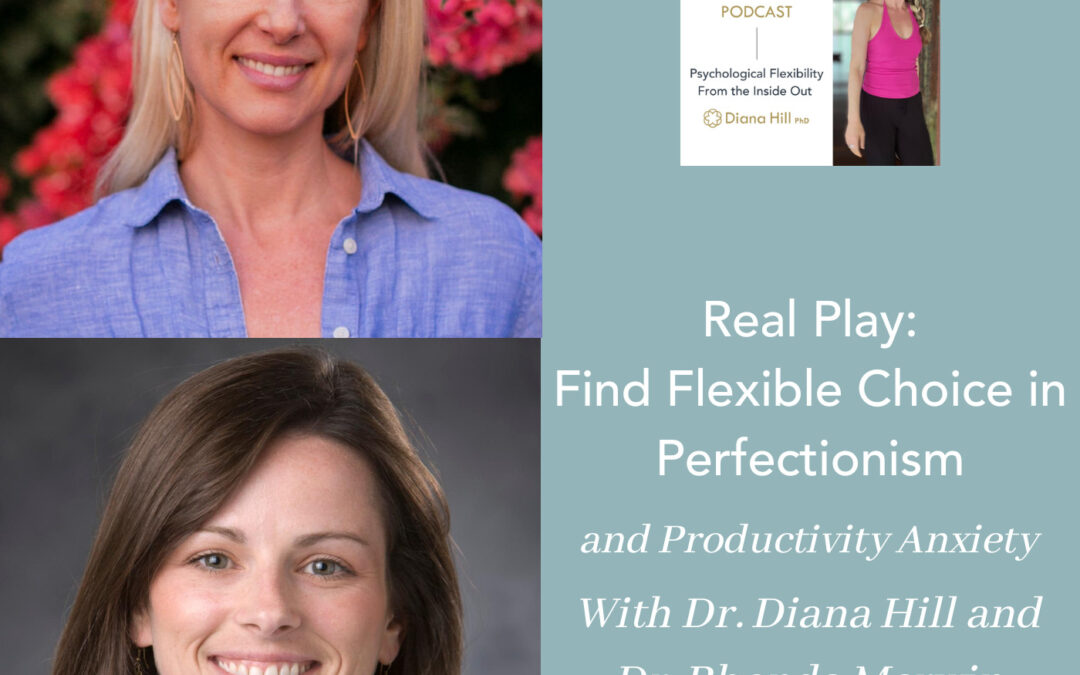When you are perfectionistic and productive, you might get praise from others, or feel like you have control in your life. But there are negative side effects to your rigidity and drive, like burnout or missing out on the life you really want. In this real play, Rhonda Merwin shows us how to do a functional analysis of your behavior to learn what is driving it and how to use attunement, flexibility, and values to broaden your repertoire of responses.
Listen and Learn:
- Why does perfectionism and productivity anxiety develop?
- How to do a functional analysis
- The power of putting constraints on your perfectionism and striving
- The Saturday morning question
- How to develop more inner attunement
- Learning to know what you want
- The one-eye-in and one-eye-out practice
- How to broaden your repertoire
About Rhonda Merwin
Rhonda M. Merwin, PhD, is an Associate Professor in the Department of Psychiatry and Behavioral Sciences at Duke University. Dr. Merwin conducts research on the mechanisms and treatment of eating disorders, generally and specifically in the context of type 1 diabetes. She is particularly interested in the use of acceptance, mindfulness and value-based interventions and mobile technology for real-time (ecological momentary) assessment and intervention and skills generalization. Her research is funded by the NIH among other sources. Dr. Merwin is a Peer-Reviewed ACT trainer, the Director of the ACT at Duke Clinical and Training Program, is the incoming president of the Association for Contextual Behavioral Sciences and is the co-author of ACT for Anorexia. For more information about Dr. Merwin’s research, educational and clinical activities, see ACTatDuke.org.
About Diana Hill
Diana Hill, PhD is a clinical psychologist, international trainer and sought-out speaker on Acceptance and Commitment Therapy (ACT) and compassion. Host of the podcast Your Life in Process and co-author of ACT Daily Journal, Diana works with organizations and individuals to develop psychological flexibility so that they can take wise action toward fulfilling and impactful lives. Integrating her over 20 years of meditation experience with yoga and psychological training, Diana blogs for Psychology Today and Mindful.org and guest teaches at InsightLA, Blue Spirit Costa Rica, PESI, Praxis Continuing Education, Yoga Soup and Insight Timer Meditation. Diana practices what she preaches in her daily life as a mom of two boys and bee guardian. Go to drdianahill.com or her channels on Instagram, Facebook, Twitter, YouTube (@drdianahill) to learn more.
Related Resources
Subscribe to my free Wise Effort newsletter
Become a MORE Life in Process member to support the show. ➡️
Find out what kind of Striver you are and get your free Skillful Striving Toolkit
Want to learn more about ACT? Take Diana’s on-demand course Foundations of ACT
Listen to Diana’s Episode on ACT for Body Image Flexibility
Listen to Diana’s Interview with Rhonda Merwin’s Mentor and ACT co-founder Kelly Wilson
Learn more about the Association for Contextual Behavioral Sciences (ACBS)
Read Rhonda Merwin’s book on ACT for Anorexia
Learn more about Rhonda Merwin’s work at Duke University
Diana’s Events
Sign up for Diana’s Reset and Restore Retreat in Costa Rica in Spring 2024!
Meditate with Diana at Yoga Soup
Watch Diana’s From Striving to Thriving Summit!
Learn from Diana at an upcoming event
Connect With Diana
Thank you for listening to Your Life in Process!
Subscribe to the podcast for free on Apple Podcasts, Spotify, Google Podcasts.
Follow Diana on YouTube, Instagram, LinkedIn, Facebook, and Diana’s website.
Leave feedback for the show or a voicemail at (805) 457-2776
Thank you to the team Craig and Ashley Hiatt. Thank you to Benjamin Gould of Bell & Branch for your beautiful music.
Remember when you become psychologically flexible, you become free.


